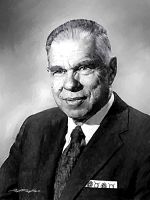Glenn T. Seaborg Ph.D.
Glenn T. Seaborg Ph.D.
The Nobel Prize in Chemistry 1951
National Medal of Science – Chemistry 1991
Nobel co-recipient: Edwin M. McMillan
Franck Report: “I had joined a committee of scientists who advocated the use of the atomic bomb for demonstration purposes. We hoped the enemy would see the destructive power of this weapon and immediately surrender. In June, 1945, we attempted to deliver our plan, the Franck Report, to President Truman. I don’t know if he ever saw our work…”
Biographies
Books
Publications other than books
Papers, Library of Congress
History of Scientific Discovery
Patents
Quotations
External Resources Text/Videos
Bearing Seaborg’s Name
Images
Harassment
Nat’l Medal, Chemistry
Quotations
- [In US Senate] Knowing the questioner helped, too. At one hearing, Sen. Al Gore Sr. (father of the vice president), grilled me about why the Atomic Energy Commission was laying off machinists at the Oak Ridge facility in his home state, finally asking: “Dr. Seaborg, just what do you have against machinists?”
“I don’t have anything against machinists, Senator. In fact, my father was a machinist,” I responded. “My grandfather was a machinist. My great-grandfather was a machinist. And if I had any talent for it, I would have been a machinist, too.” The good-natured Gore broke into laughter and dropped his line of questioning.
- In 1961, when the Kennedy administration was considering renewing atmospheric testing (there had been a moratorium on testing when the Soviets suddenly began to test in the atmosphere), Dr. Seaborg was asked to appear on Meet the Press. Dr. Seaborg remembered, “I got in touch with President Kennedy before I appeared on Meet the Press and I said, ‘They’re going to ask me if you’re going to decide to resume the atmospheric testing of nuclear weapons, and what shall I say?’ And he said, ‘Oh, be very forthcoming but don’t tell them anything.’ Well, I had a very rough 30 minutes on Meet the Press.”
- At another hearing, however, when an irascible elderly senator demanded, “What do you know about plutonium?” I gave a vague but reassuring answer. I knew from experience that embarrassing him in public would have led to a larger budget cut than we were already in for.
- My stature as a scientist gave me some latitude in diplomatic relations…These visits also gave me a look inside the Soviet nuclear program. Flaws were evident in their reactor design–flaws that became disastrous at Chernobyl. To avoid another Chernobyl, there’s an urgent need for western technical help in improving nuclear power plants in the former eastern bloc and for help in preventing weapons-grade nuclear products from falling into the wrong hands.
- President Lyndon Johnson was the most powerful and persuasive personality I ever met. He towered over others physically and emotionally, his exuberant presence filling the room. When he gave you his full attention, you felt surrounded.
- President Reagan’s … obsession with national security was so great that it demanded a security review of the personal journals I kept as Atomic Energy Commission chairman, although they’d been declassified 20 years before. After threatening me with arrest if I did not comply, a team of government experts, representing the man who had campaigned against “waste, fraud, and abuse,” spent hundreds of hours deleting sensitive information, such as an account of taking our children trick or treating on Halloween.
- “This is the greatest honor ever bestowed upon me-even better, I think, than winning the Nobel Prize”- about the naming of Element 106 seaborgium.
- Upon being appointed Berkeley Chancellor in 1958, Seaborg’s speech: “There is a beauty in discovery. There is mathematics in music, a kinship of science and poetry in the description of nature, and exquisite form in a molecule. Attempts to place different disciplines in different camps are revealed as artificial in the face of the unity of knowledge. All literate men are sustained by the philosopher, the historian, the political analyst, the economist, the scientist, the poet, the artisan and the musician.”
